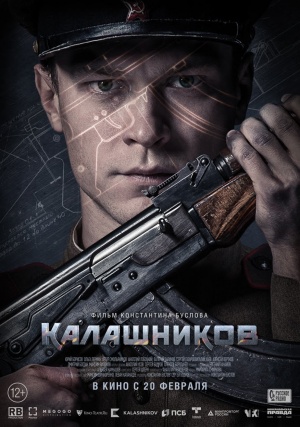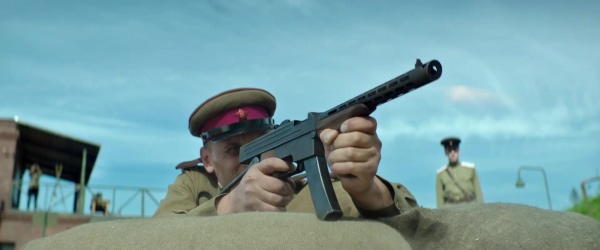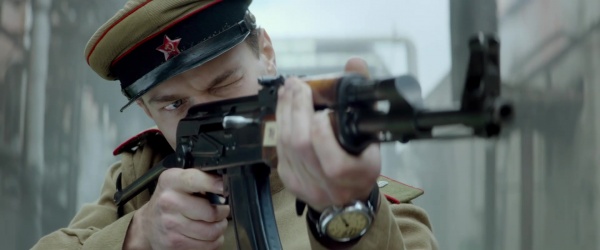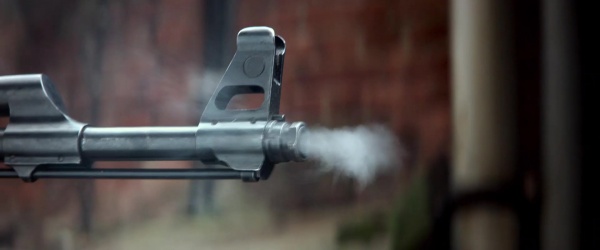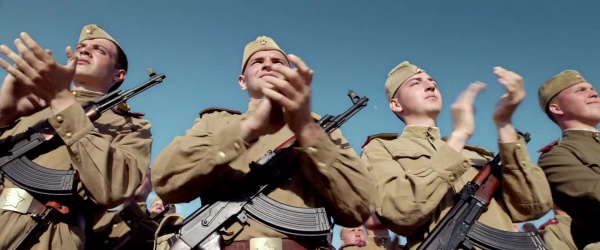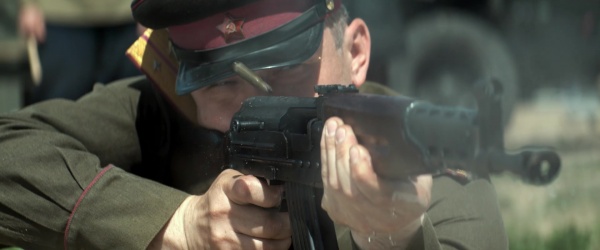Kalashnikov
Калашников
|
|
Movie Poster
|
| Country
|
 Russia Russia
|
| Directed by
|
Konstantin Buslov
|
| Release Date
|
2020
|
| Language
|
Russian
German
|
| Studio
|
RB production
|
|
|
Kalashnikov (also known as AK-47 in the West) is a 2020 Russian biographical drama directed by Konstantin Buslov about the inventor of the AK-47, Mikhail Kalashnikov. The film takes place from 1943 to 1949, and chronicles the story of how Kalashnikov went from a tanker on the Eastern Front to the inventor of the service rifle of the Soviet Union.
The following weapons were used in the film Kalashnikov:
Handguns
Tokarev TT-33
Mikhail Kalashnikov (Yuriy Borisov) uses a Tokarev TT-33, given to him by Sahakyants (Armen Arushanyan). NKVD Captain Lobov (Aleksey Vertkov) also uses a Tokarev TT-33.

Tokarev TT-33 - 7.62x25mm Tokarev. Pre-1947 version.
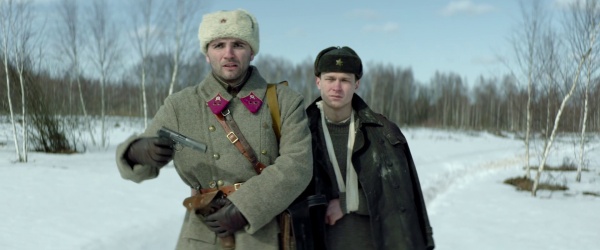
Sahakyants giving Kalashnikov his TT-33.
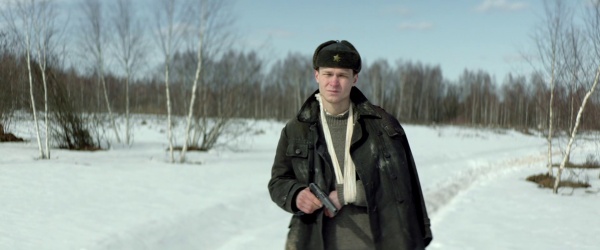
Mikhail Kalashnikov holds the TT-33.
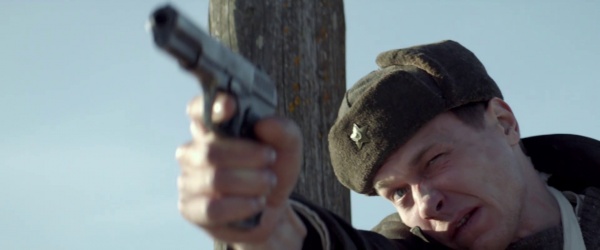
Mikhail Kalashnikov provides suppressing fire against Wehrmacht soldiers with his TT-33.
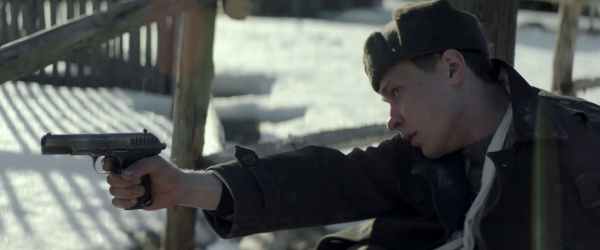
Mikhail Kalashnikov returns fire against Wehrmacht soldiers with his TT-33.

NKVD Captain Lobov holds Mikhail Kalashnikov at gunpoint.
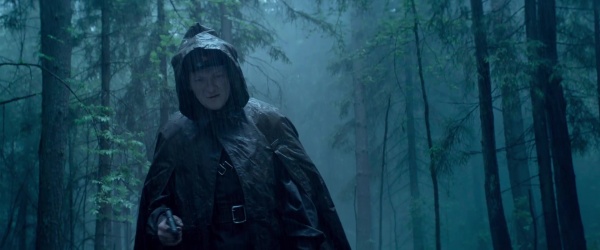
NKVD Captain Lobov holds Mikhail Kalashnikov at gunpoint.
Nagant M1895
The Nagant M1895 revolver is used by Soviet soldiers. Captain Lyutyy (Artur Smolyaninov) celebrates the end of the Great Patriotic War by shooting his.
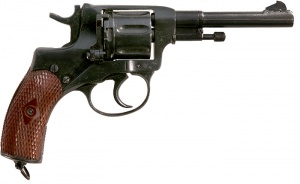
Nagant M1895 Revolver - 7.62x38R Nagant.

Captain Lyutyy draws his Nagant M1895 revolver.

Captain Lyutyy celebrates by shooting his Nagant M1895 revolver.
Submachine Guns
PPSh-41
Sahakyants is armed with a PPSh-41. PPSh-41s are also seen on the conveyor belt at a factory production line.

PPSh-41 Submachine Gun - 7.62x25mm Tokarev
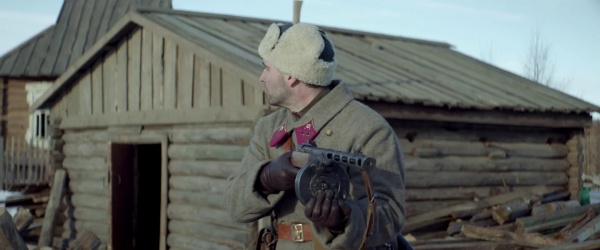
Sahakyants aiming his PPSh-41 at Wehrmacht soldiers.
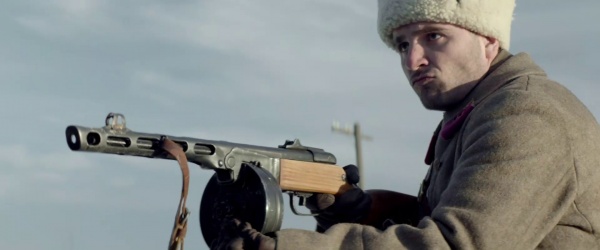
Sahakyants returning fire with his PPSh-41.
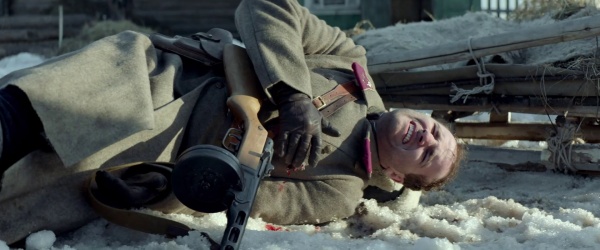
A wounded Sahakyants lies in pain, with his PPSh-41.
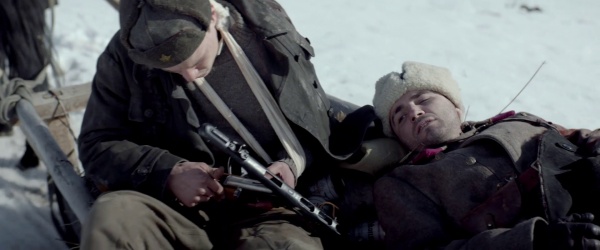
Mikhail Kalashnikov demonstrates early on his passion for weapons engineering as he examines Sahakyants' PPSh-41, which failed to fire earlier; he concludes that water got inside the magazine, making the rounds freeze. He also comments that the spring is weak and not finished properly, making it not powerful enough to fire the rounds.
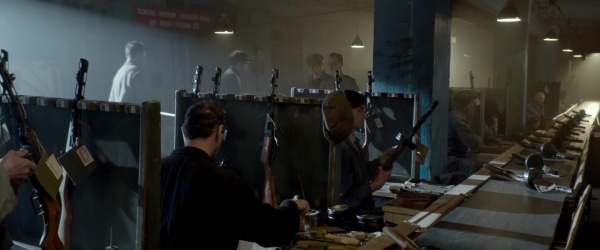
PPSh-41s at a factory production line.
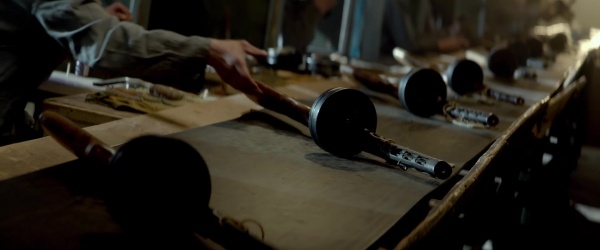
PPSh-41s at a factory production line.
PPS-43
Alexey Sudaev (Dmitry Bogdan) presents his PPS-43 at the 1943 weapons competition and wins, defeating Kalashnikov's PPK-42. In 1945, some Red Army soldiers are seen armed with PPS-43s and celebrating the defeat of Nazi Germany.
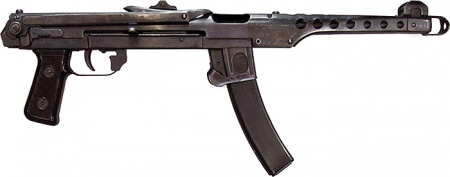
PPS-43 - 7.62x25mm Tokarev
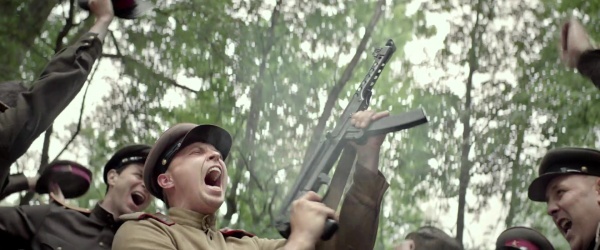
Rejoicing at the Soviet victory over Nazi Germany, a Red Army soldier fires his PPS-43 skyward in celebration.
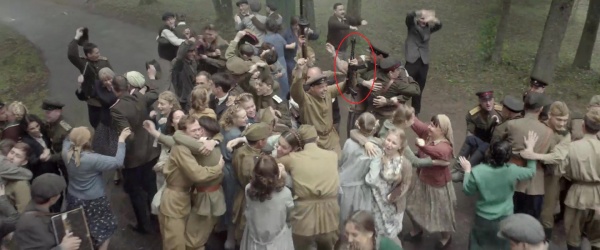
The same soldier celebrating, holding his PPS-43.
PPK prototype
Mikhail Kalashnikov creates a first prototype at the Matay Railway Plant and goes with it to Alma-Ata to present it to Lieutenant Colonel Basarov (Seydulla Moldakhanov). Kalashnikov gets detained for showing the PPK prototype, which is mistaken for a threat on his part, and thus the weapon is seized by soldiers. Major Lebedev (Dmitriy Kulichkov) has the weapon delivered to Andrey Ivanovich Kazakov (Maksim Bityukov) to ask for his expertise on the gun. At the Gorokhovaya firing range, the PPK is tested and praised, which translates into getting Kalashnikov released and giving him a recommendation to continue his weapons development.
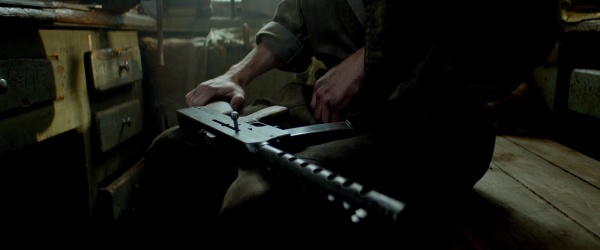
The PPK prototype designed at the Matay Railway Plant, resting on Mikhail Kalashnikov's lap after it's finished.
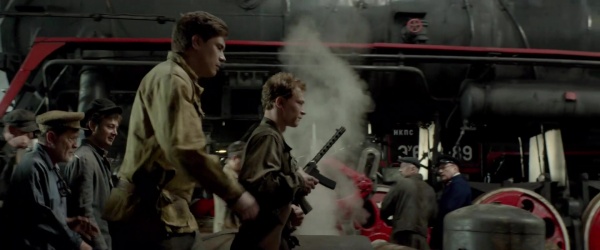
Mikhail Kalashnikov, Zhenya Kravchenko (Mikhail Gudoshnikov) and the Matay Railway Plant workers head outside to test-fire the PPK Prototype.
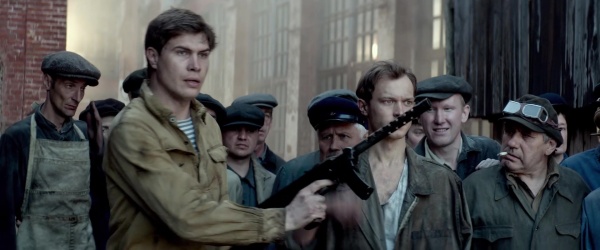
Zhenya Kravchenko about to test-fire the PPK prototype produced at the Matay Railway Plant by himself, Kalashnikov and its workers.
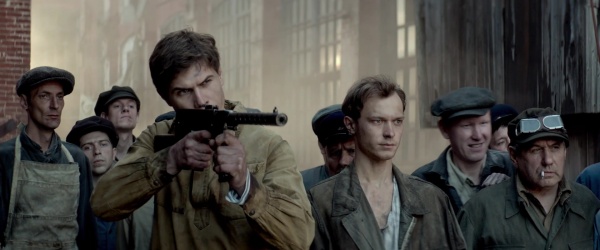
Zhenya fires the PPK at a barrel.
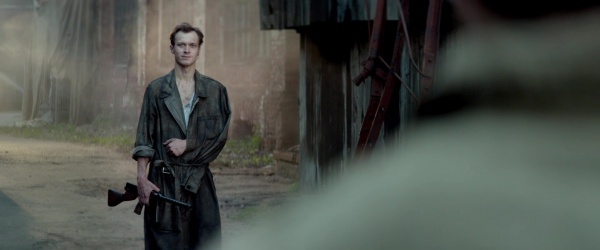
Mikhail Kalashnikov looks pleased at the result, holding his PPK Prototype.
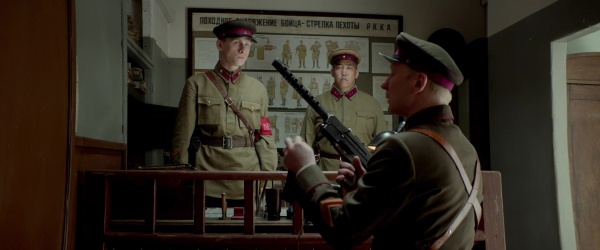
Major Lebedev inspects the seized PPK Prototype.

Major Lebedev inspects the seized PPK Prototype.
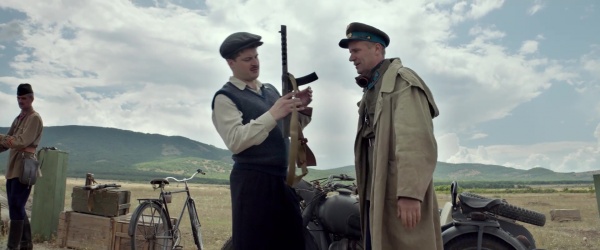
Colonel Glukhov (Anatoliy Lobotskiy) shows the PPK prototype to weapons expert Kazakov at the Gorokhovaya firing range.
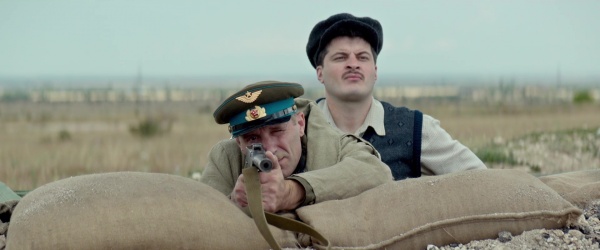
Colonel Glukhov aiming the PPK protoype.
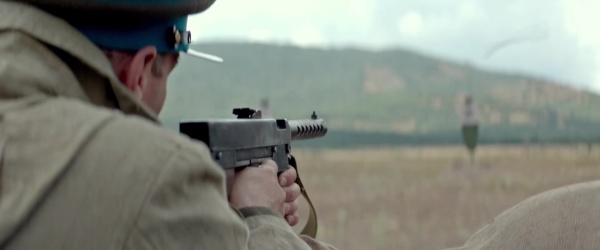
Colonel Glukhov aiming the PPK protoype.
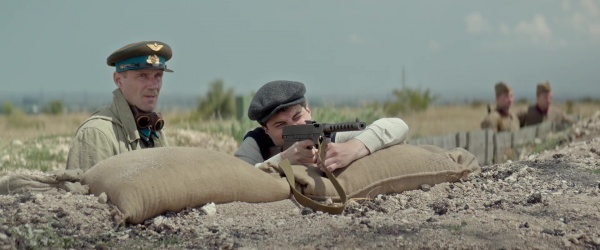
Kazakov firing the PPK protoype.
PPK-42
In 1942, while still on sick leave, Mikhail Kalashnikov modifies his prototype to the PPK-42 in order to present it before General Kurbatkin (Vitaliy Khaev), so he may get a recommendation for state trials. The PPK-42 eventually competes against Sudaev's PPS-43. His weapon, however, loses the contest to the PPS-43.

PPK-42 - 7.62x25mm Tokarev
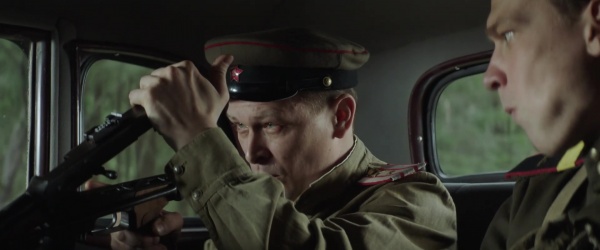
Kalashnikov meets weapons designer Alexey Ivanovich Sudaev (Dmitriy Bogdan) for the first time. Sudaev inspects Kalashnikov's modified PPK protoype, now designated PPK-42.

Mikhail Kalashnikov showing General Kurbatkin how to operate the PPK-42.
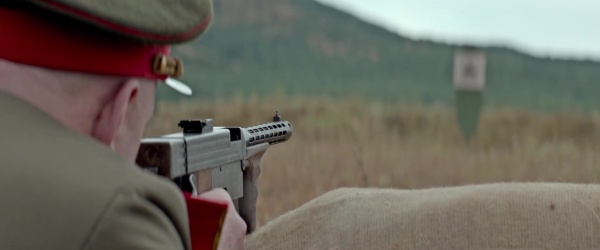
General Kurbatkin aims the PPK-42.
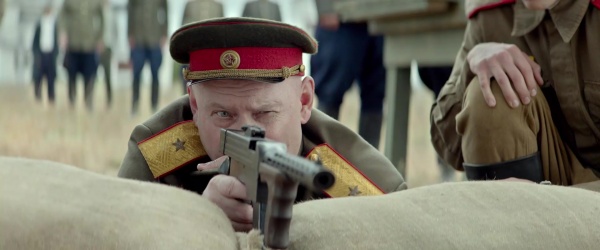
General Kurbatkin test-fires the PPK-42.
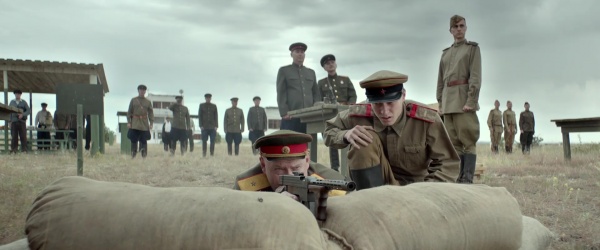
General Kurbatkin test-fires the PPK-42.
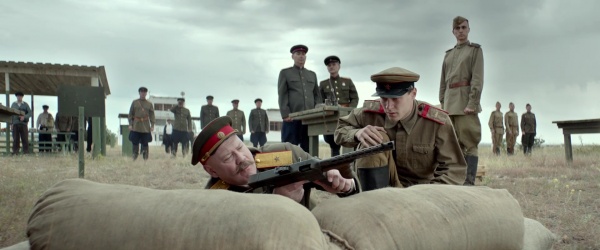
General Kurbatkin reloads the PPK-42.
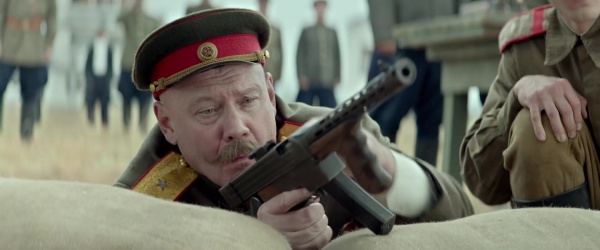
General Kurbatkin reloads the PPK-42.

General Kurbatkin leaves the PPK-42 after testing it successfully.
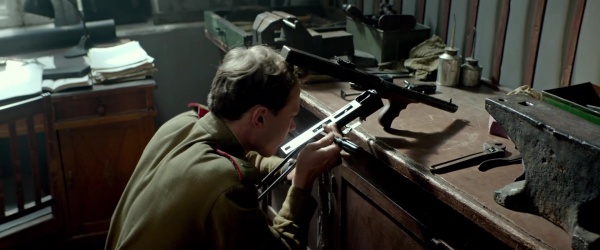
Kalashnikov inspects his PPK-42.
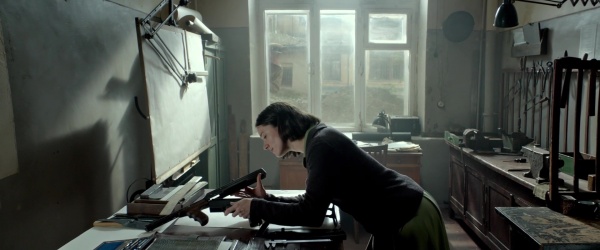
Katya (Olga Lerman) inspects the PPK-42. She was an engineer and did much technical drawing work for her husband, Mikhail Kalashnikov, which is displayed in great detail in the film.
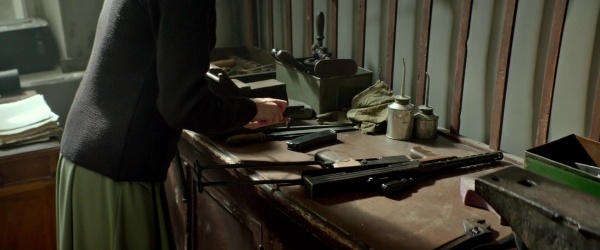
The PPK-42 lying on the kitchen counter by Katya.
Rifles
Mosin Nagant M91/30
Red Army soldiers are armed throughout the film with Mosin Nagant M91/30 rifles.

Mosin Nagant M91/30 - 7.62x54mmR
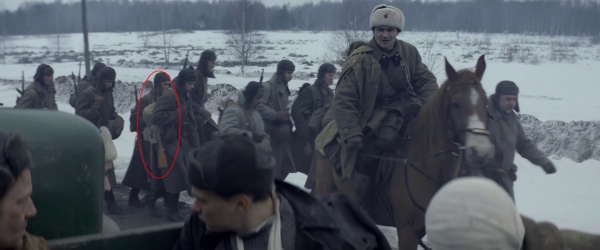
Soldiers with shoulder-slung Mosin Nagants
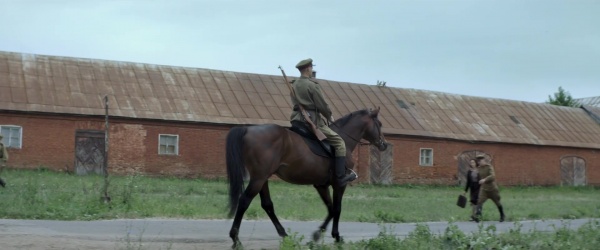
Red Army soldier on horseback with a shoulder-slung Mosin Nagant

Red Army soldier with a shoulder-slung Mosin Nagant, equipped with a bayonet.
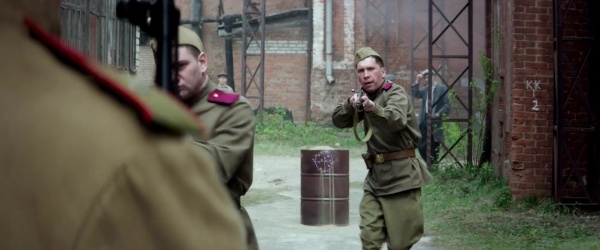
Red Army soldiers hold up Mikhail Kalashnikov for opening fire with his AKS-47 in an unauthorized area.
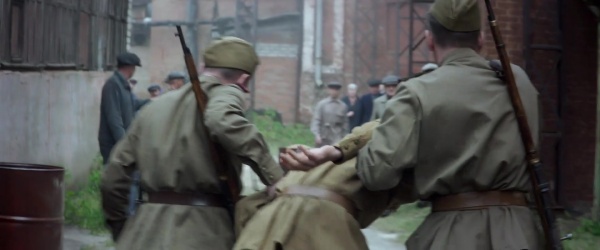
The Red Army soldiers detain Kalashnikov.
SVT-40
Some Red Army soldiers are seen with shoulder-slung SVT-40s, although they are difficult to make out.

Tokarev SVT-40 - 7.62x54mmR

A Red Army soldier in the background with an SVT-40 shoulder-slung.
Mauser Karabiner 98k
Mikhail Kalashnikov and Sahakyants engage some German Wehrmacht soldiers, who are armed with Mauser Karabiner 98k rifles.

Karabiner 98k - 7.92x57mm Mauser
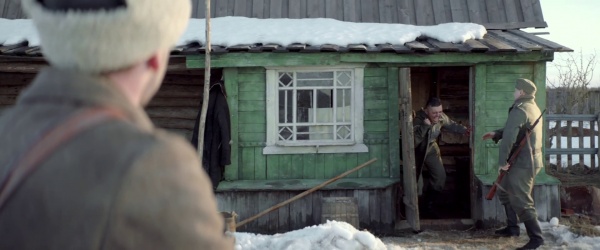
Sahakyants confronts the Wehrmacht soldiers armed with Kar98k rifles. Notice one has his sight raised.
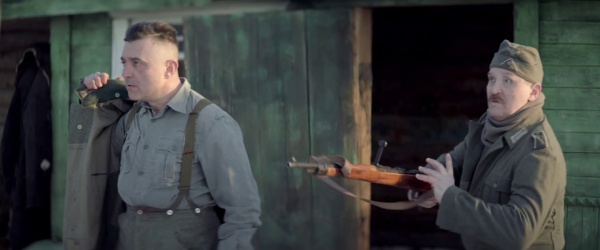
The Wehrmacht soldier quickly reacts and reaches for his Kar98k. Notice the raised sight.
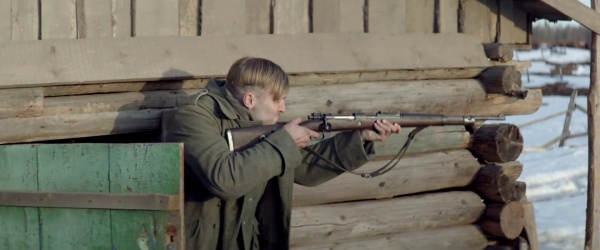
Another Wehrmacht soldier, armed with a Kar98k, sneaks behind Sahakyants.
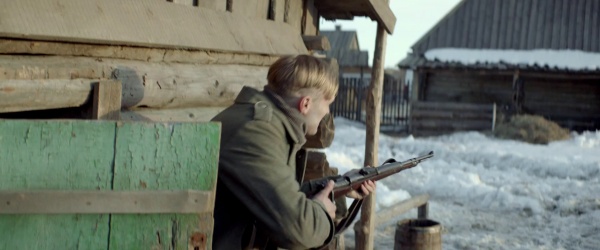
The Wehrmacht soldier reloads.
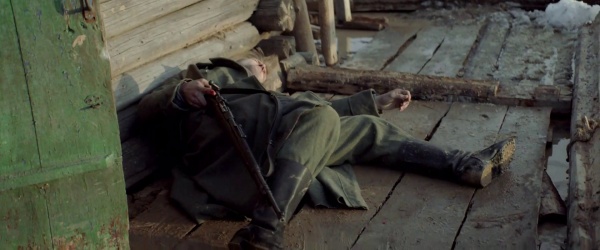
The Wehrmacht soldier, still clutching his Kar98k, lies dead after being shot by Mikhail Kalashnikov.
Assault Rifles
AK-46
In the process of developing an assault rifle for a weapons competition, Mikhail Kalashnikov creates the AK-46, the precursor to the AK-47. Following Sudaev's advice, he makes the device even simpler, which results in the creation of the legendary rifle.
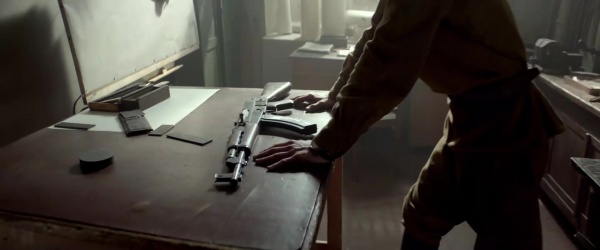
With the war over, Mikhail Kalashnikov stands before his AK-46 with worry, contemplating the ambiguous future of the weapon. An easy way to notice this is the AK-46 and not the Type I AK-47 prototype is to look at the vent holes in the handguard; the AK-47 has two, whereas the AK-46 had three.
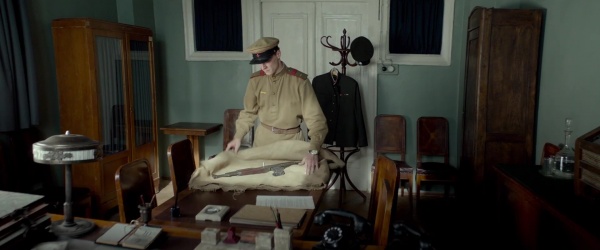
Mikhail Kalashnikov showcasing his AK-46 as a means to request further research and development on the weapon.
AKS-47
Mikhail Kalashnikov creates and presents the Type I AKS-47 at state trials. It competes against the AD-46 (Dementiev KB-2) and the AB-46 (Bulkin TKB-415), managing to surpass them both. In the film, Kalashnikov produces and submits for trials an early development of the AK design, the AKS (S—Skladnoy or "folding"), equipped with an underfolding metal shoulder stock. The AK-47 was officially accepted by the Soviet Armed Forces in 1949 and used by the majority of the member states of the Warsaw Pact thereafter. The weapon and its derivatives quickly became legendary, the most ubiquitous assault rifle in the world since then, known for its ease of use, reliability and simplicity.

Type I AKS-47 - 7.62x39mm
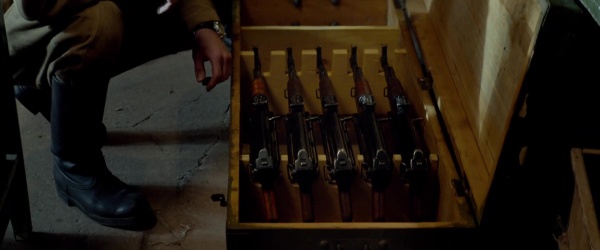
Mikhail Kalashnikov receives a crate with his brand-new Type I AKS-47 models.
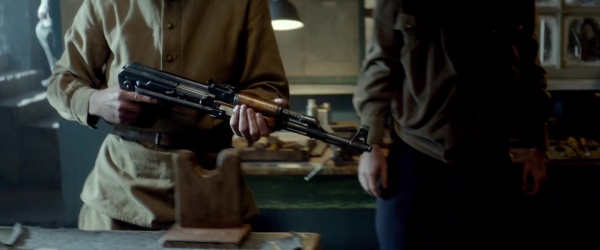
Mikhail Kalashnikov checks one of the Type I AKS-47 models.
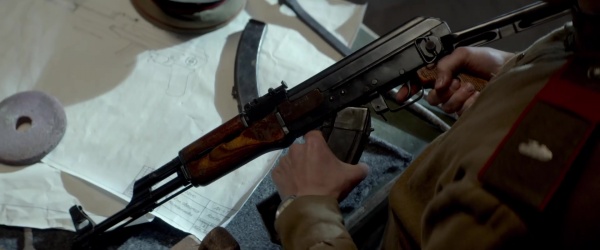
Inserting a fresh magazine.
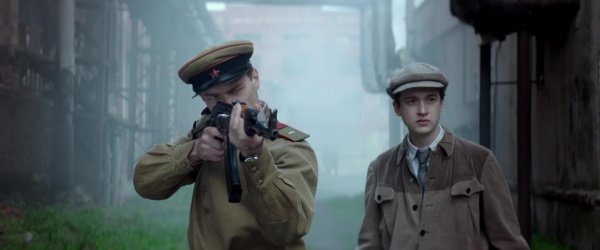
Mikhail Kalashnikov aiming the Type I AKS-47 at a makeshift target without authorization, after being denied entrance to the firing range (since it was reserved for the day for Degtyaryov and his team).
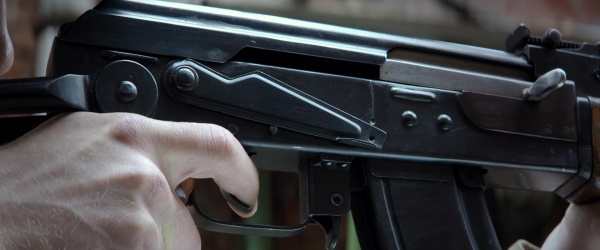
Close-up on the receiver.

Another close-up of the receiver.

The Type I AKS-47, lying on a table.
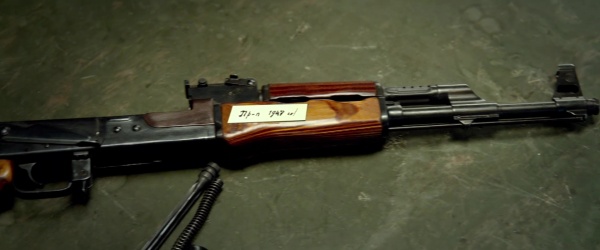
The disassembled Type I AKS-47.
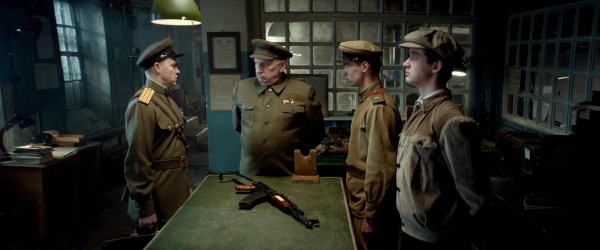
The Type I AKS-47 lying on a table, after being inspected by weapons designer Vasily Degtyaryov (
Valeriy Barinov).
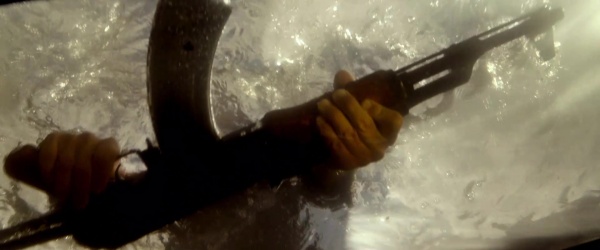
Type I AKS-47 during state trials, being tested for water-proofing.
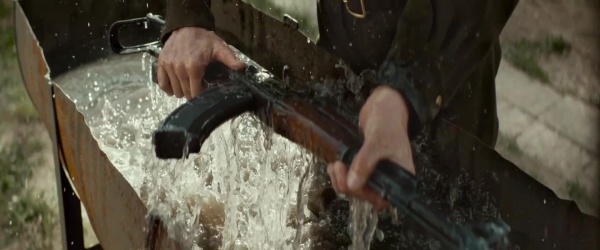
Retrieving the Type I AKS-47 after testing for water-proofing.
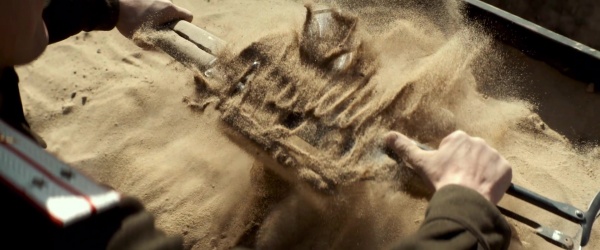
Type I AKS-47 during state trials, being tested for sand/dust proofing.
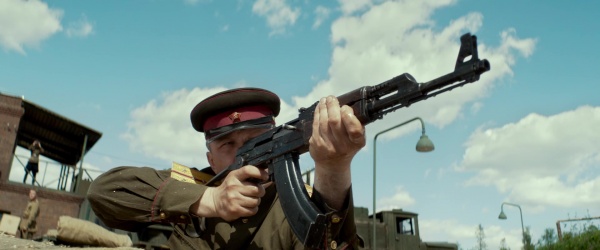
Aiming the Type I AKS-47 during state trials.
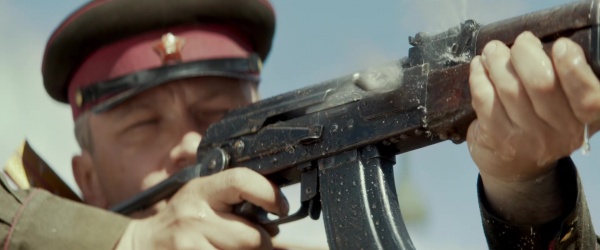
Firing the water-tested Type I AKS-47 during state trials.
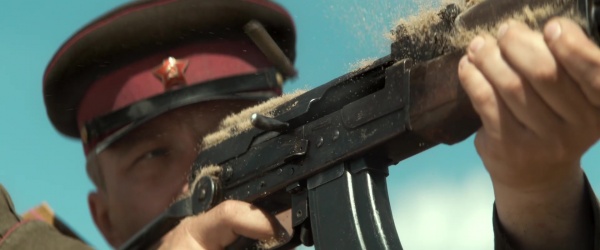
Firing the sand-covered and water-tested Type I AKS-47 during state trials; needless to say, it exceeds all expectations.
AK-47
Kalashnikov's work culminates in the creation of the legendary AK-47 rifle series, which is adopted as the official service rifle of the Soviet Union in 1949 as the "7.62 mm Kalashnikov rifle (AK)". This detail is important, as the final scene shows a blatant mistake: the rifle is referred to as the "AK-47" by Marshal Nikolay Voronov (Valeriy Afanasev), who asserts "his (Kalashnikov's) AK-47 represents the future of global armaments". It should be noted that this is a common mistake (even in Russia and the former USSR), which is to refer to the designation of the AK as "AK-47" after the name of its designer (Mikhail Kalashnikov) and its year of invention, claiming the designation was by the Soviet Army itself. In reality, the AK-47 designation has always been purely Western in nature, as in the Soviet Union it was officially designated simply "AK," after Avtomat Kalashnikova (Russian: Автомат Калашникова, "Kalashnikov's Automatic Device"). In Russia and other ex-Soviet States, the AK is simply referred to by the "AK" designation, and oftentimes together with its caliber (7.62x39mm) to avoid confusion with other variants. In recent years, however, due to the popularity of the "AK-47" designation abroad, this designation is now commonplace even in Russia and across the former USSR, probably since it is the term foreigners are acquainted with. Its official Russian designation remains "7,62mm Avtomat Kalashnikova (AK)" .
AK #1
Mikhail Kalashnikov creates the first AK at the Degtyaryov plant, but it is not seen in the film; only the AKS is shown and submitted to state trials.

AK-47 serial number 1 - 7.62x39mm

A technical drawing of the AMK, which eventually was simplified and turned into the Type I AK-47 model.
Type III
Soviet soldiers are seen armed with the AK-47 Type III in 1949.

Type III AK-47 - 7.62x39mm
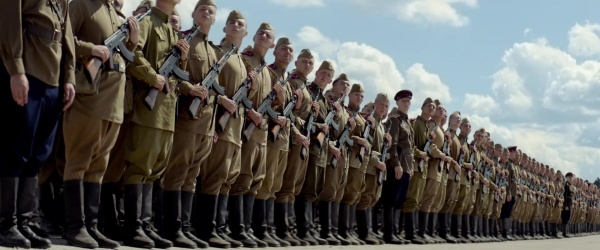
Soviet Army soldiers with their brand-new final production Type III AK-47s, standing at attention for Kalashnikov's arrival.
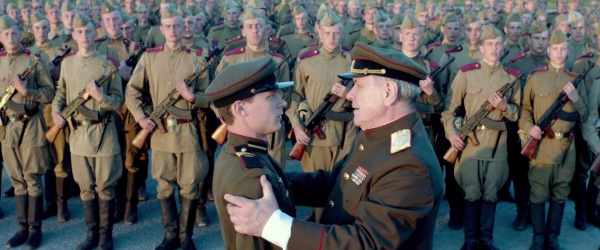
Mikhail Kalashnikov being congratulated on the adoption of the AK-47 as the official service rifle of the Soviet Army in 1949.
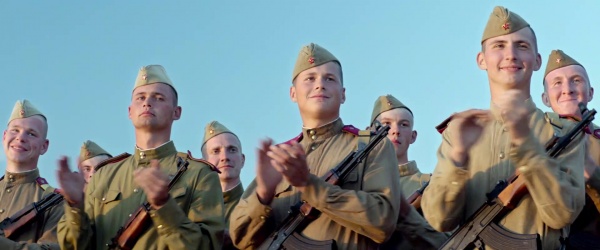
Soviet Army soldiers with their brand-new final production Type III AK-47s, applauding in celebration of Mikhail Kalashnikov.
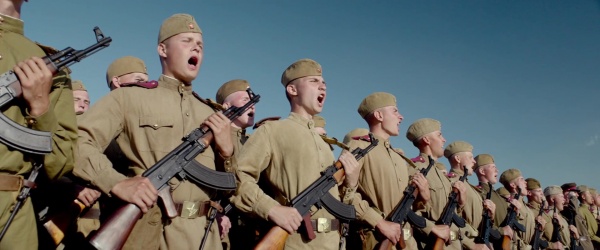
Soviet Army soldiers holding their AK-47s while giving a "Urrah!" battle cry. Note the early slab-sided magazine to the left, which differs from the rest of the ribbed final production magazines.
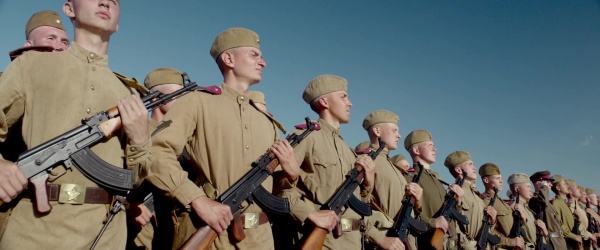
Note these are the final production magazines.
AB-46
Along with the AKS-47, AD-46 and other assault rifles, the AB-46 (Bulkin TKB-415) is presented at the assault rifle state trials. It competes against the AD-46 (Dementiev KB-2) and the AKS-47.

AB (Avtomat Bulkina) -46 (TKB-415) - 7.62x39mm
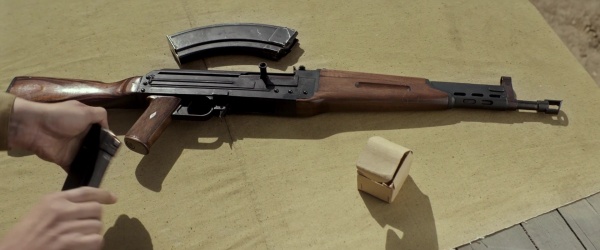
The AB-46 about to be tested.
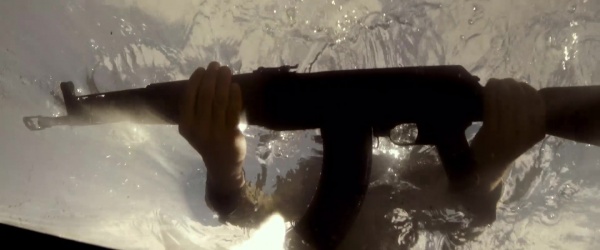
Testing the AB-46 for water-proofing.
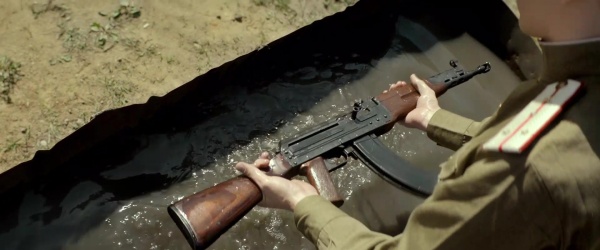
Retrieving the AB-46 after water-proofing testing.
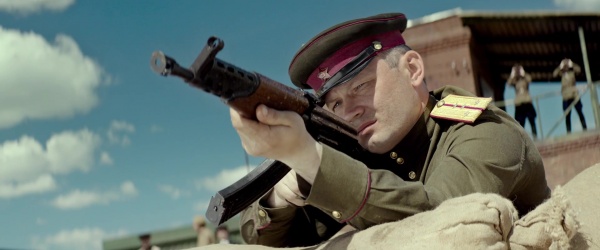
The AB-46 manages to fire two rounds before jamming; the breech block mechanism is unresponsive.
AD-46
Along with the AKS-47, AB-46 (Bulkin TKB-415) and other assault rifles, the AD-46 (Dementiev KB-2) is presented at the assault rifle state trials. It competes against the AB-46 and the AKS-47.

AD (Avtomat Dementieva) -46 (KB-2) - 7.62x39mm
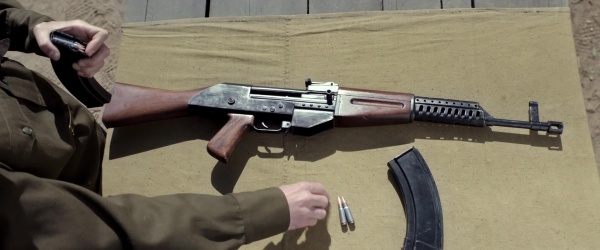
The AD-46 about to be tested.
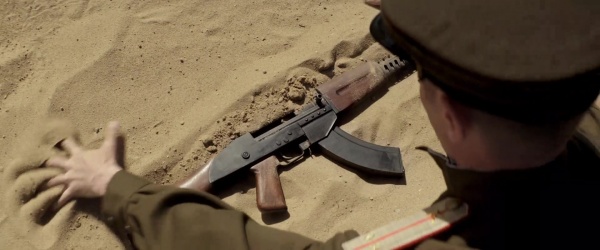
About to test the AB-46 for sand/dust-proofing.
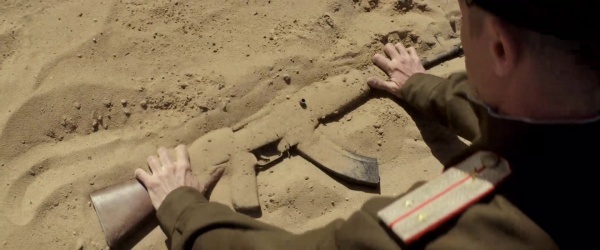
Testing the AB-46 for sand/dust-proofing.
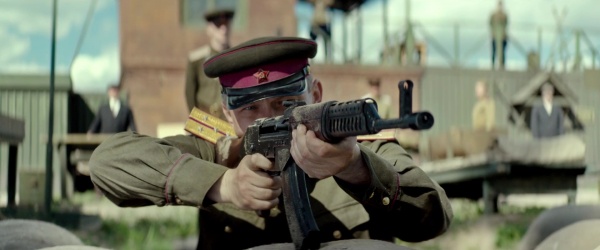
Firing the sand-covered and water-tested AD-46.
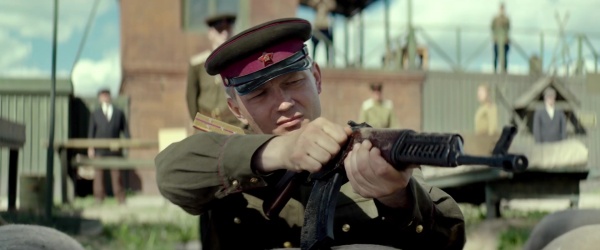
The AD-46 can't even manage to fire a single round. A blocked safety mechanism seems to be the reason.
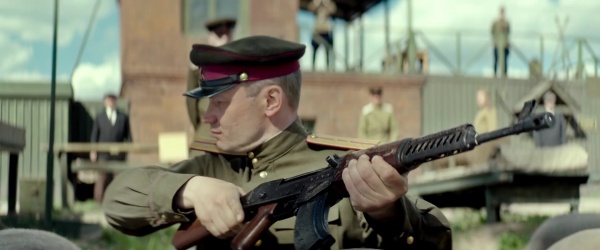
The AD-46 is turned down after failing to fire.
Machine Guns
Degtyaryov DP-27
Red Army soldiers are seen armed with DP-27s. The DP-27 also competes against the Kalashnikov LMG at State trials. Although both machine guns fail to meet State technical requirements, they are allowed to continue research and development because of the War.

DP-27 machine gun - 7.62x54mmR
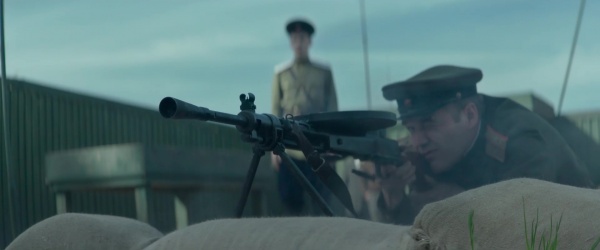
DP-27 machine gun at the state trials.
Kalashnikov LMG
Mikhail Kalashnikov creates his very first LMG at the Degtyaryov plant, and later presents it during state trials. Although both machine guns fail to meet State technical requirements, they are allowed to continue research and development because of the War.
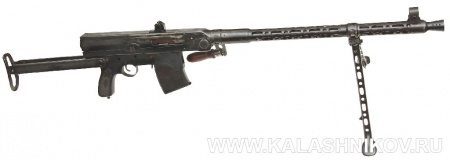
Kalashnikov LMG 1943 - 7.62x54mmR
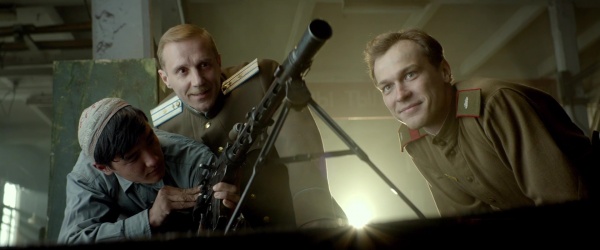
Mikhail Kalashnikov inspecting his very first LMG.
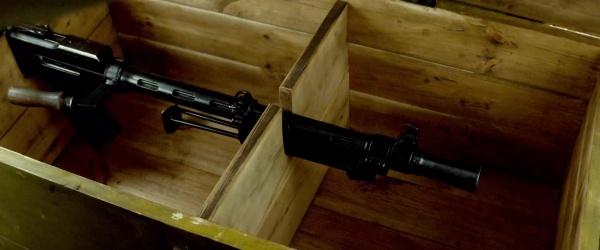
Lobov opens a crate containing the Kalashnikov LMG.
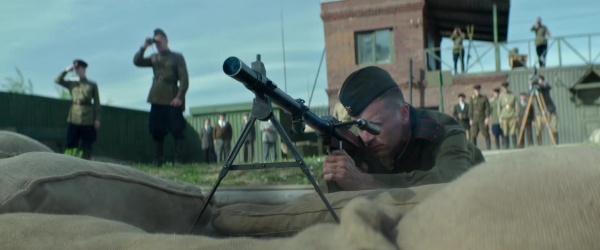
Kalashnikov LMG tried at State trials.
Other
T-34
Mikhail Kalashnikov drives a T-34 at the beginning of the film. The tank runs over an anti-tank gun and destroys it.
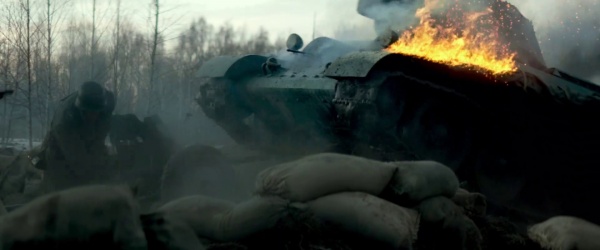
The T-34 about to crush a German anti-tank gun.
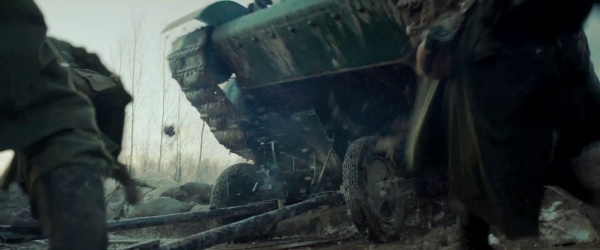
The T-34 crushes the German anti-tank gun.


